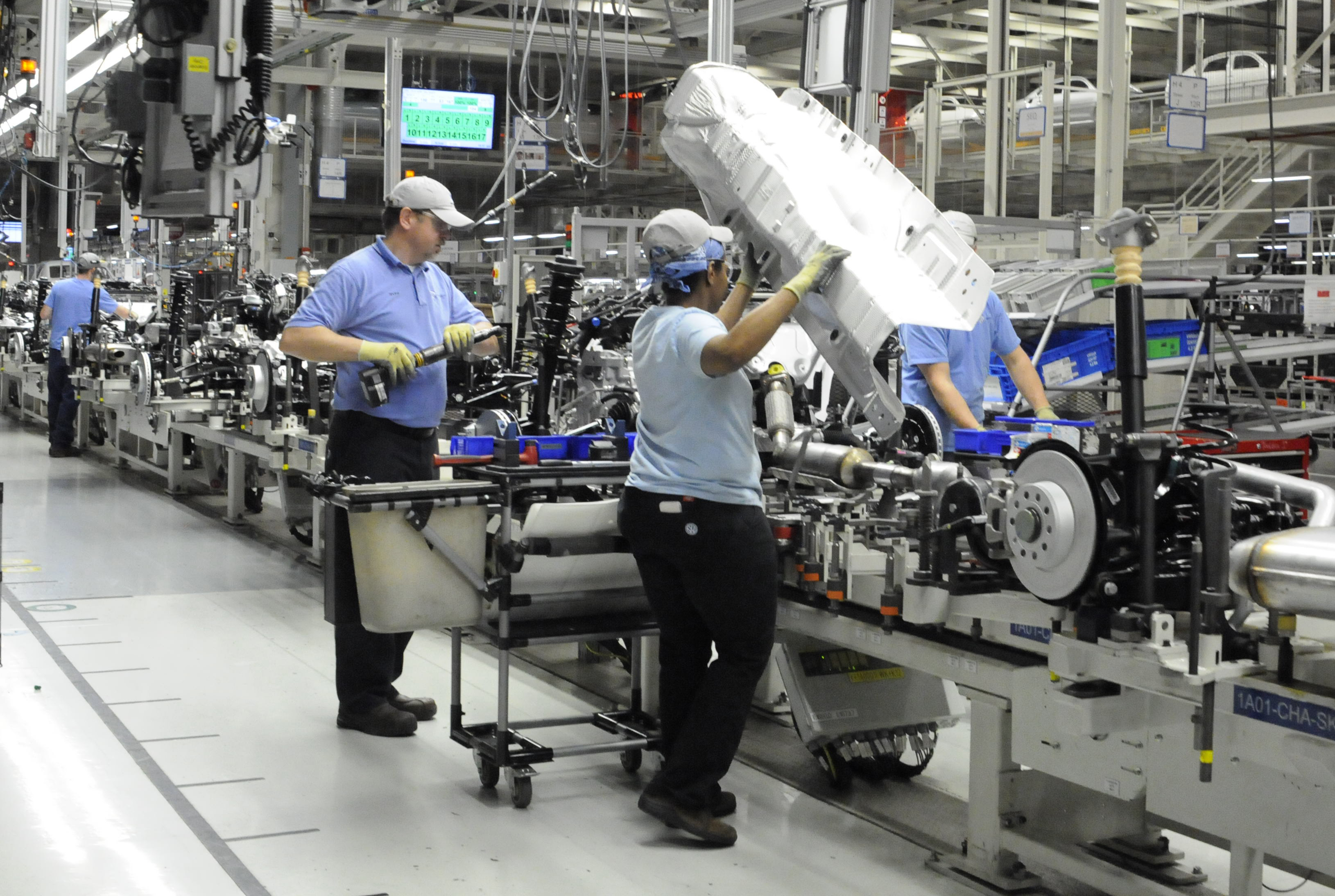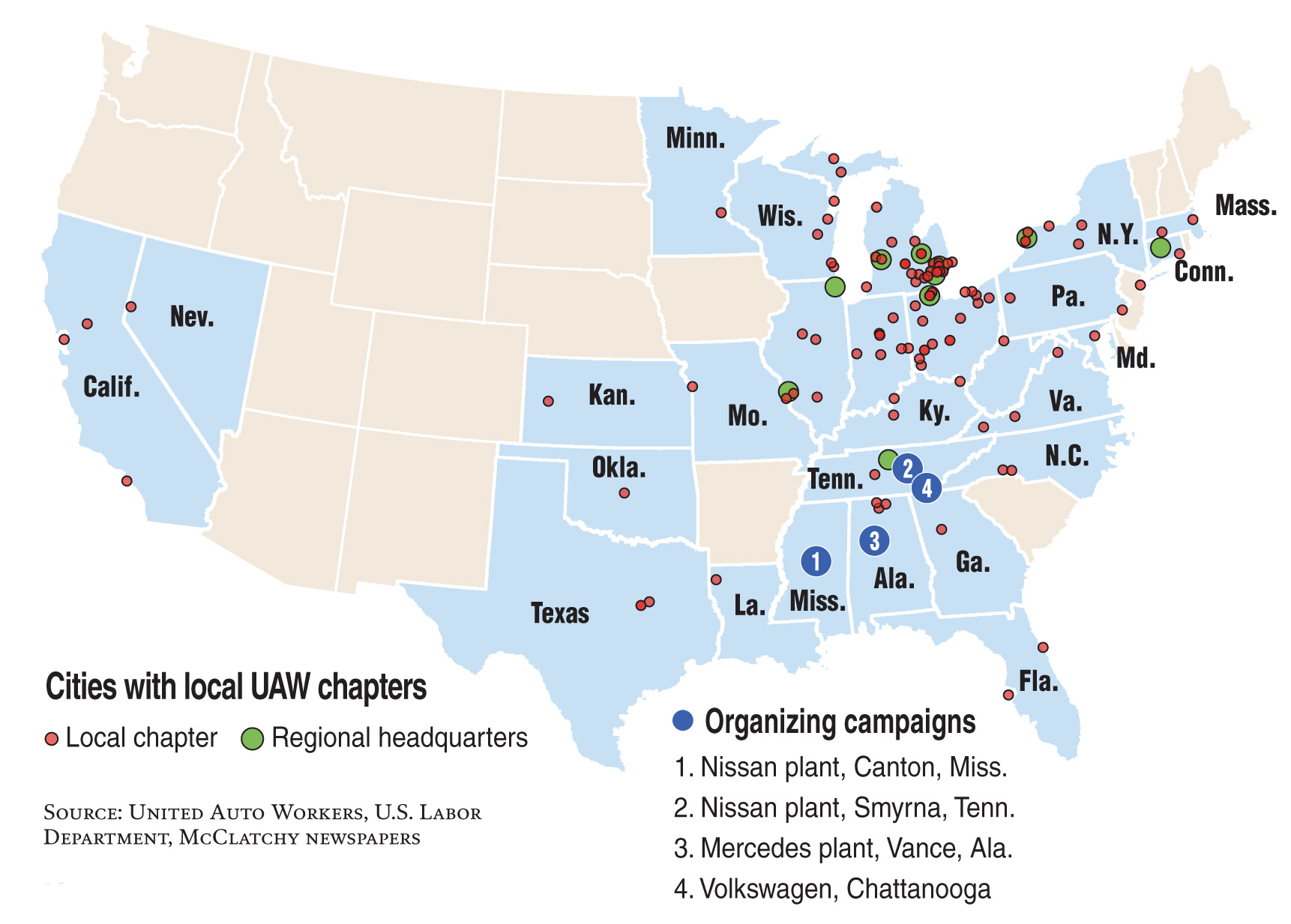What's next?
UAW supporters must collect signatures from a majority of workers in any potential bargaining unit at the Volkswagen plant.
The head of the United Auto Workers is sounding an upbeat note on a future union presence at Chattanooga's Volkswagen plant, even as others question the prospects and the wisdom of such a move.
UAW President Bob King said in an interview with a Detroit auto industry media outlet that VW is successful globally, in part, because all of its plants -- except in Chattanooga -- are represented by labor unions and employees share in decision-making through works councils.
"I think that one of the reasons that Volkswagen is arguably the most successful company in the world is that in every single one of their facilities, with the exception of Chattanooga to this point, they have employee representation," King told AutolineDetroit last week. "I've always been impressed with the co-determination system."
One observer of U.S. labor issues said that while he expected King to sound optimistic no matter the real prospects of organizing VW in Chattanooga, the UAW likely has a better chance with VW workers in the city than it does at other car plants in the South.
Matt Patterson, senior fellow of the Center for Economic Freedom with the Competitive Enterprise Institute in Washington, D.C., cited the support of the powerful IG Metall union in Germany, which in a letter to hourly Chattanooga VW workers this spring backed the UAW's efforts.
"That was enormously helpful," Patterson said. "That can't help but help [King]."
Still, Patterson added that King has no choice but to appear upbeat because the UAW needs to organize the plants of foreign automakers in the U.S.
"They need those transnationals," he said.
While the UAW added members for the third straight year in 2012 -- up 0.5 percent to 382,000 members -- membership fell sharply before that. The number of UAW members peaked in 1979 at about 1.5 million before sinking to 355,191 in 2009.
But in March, VW's board member in charge of human resources at its headquarters in Wolfsburg, Germany, said the automaker was in talks with the UAW about setting up a German-style labor board at the plant that produces the Passat sedan.
Horst Neumann said the company may release a plan for a works council labor board this month or next, and formal talks with a union could begin in the second half of the year if VW's managing board approves.
To set up a works council in the U.S., a union would be needed and Chattanooga employees would have to vote it up or down. The UAW has been talking with plant employees, and supporters of the union in Chattanooga say an education effort will be needed if the organizing is to move forward.
Ed Hunter, who works in assembly at the plant, said union supporters are trying to reassure employees that there's no retribution from the company if they're interested in the works council or UAW.
"What we're striving for in the plant is to quell the nervousness of people," he said.
Hunter said all hourly employs may obtain a card that they can turn in to support the union's efforts at the plant.
Volkswagen action
This week, VW said it's continuing to work on a representation model that would fit in Chattanooga.
"Volkswagen is currently working on an innovative model for the representation of employees' interests which will be suitable for the USA," a spokesman said in an email.
King said a works council like what Volkswagen has at its other plants "would absolutely work" at the Chattanooga plant. But he noted it will require Chattanooga workers to join a union for such an organization to be started under U.S. labor law.
"What's really interesting is that everybody is represented in the works council -- union members, nonunion members, blue-collar and white-collar workers," King said.
King said the UAW's organizing campaigns at nonunion Southern auto plants, including the VW factory, already are helping the job security of auto workers. Many of the workers in Southern auto plants hired recently have been temporary, not permanent, employees.
"Now, because of our organizing efforts, I'm going to predict that you are going to start to see that change," King said. "I predict that some of these transnationals will start hiring more permanent workers as a way to slow down our organizing efforts."
King declined to discuss the UAW's talks with VW in the AutolineDetroit interview. But he said he and UAW Secretary-Treasurer Dennis WIlliams, who is responsible for organizing foreign auto companies, "reached out to every single CEO in the auto industry -- the Japanese, Germans, Koreans and everyone in the auto industry.
"We began a series of discussions," King said. "We agreed to keep them confidential about which company or which CEO we were meeting with."
Lowell Turner, a professor of international and comparative labor at Cornell University, said he has spent a lot of time in Germany and the works councils operate well.
"It's part of the explanation of the success of the German export industry," he said. Turner said the labor boards allow companies to work out problems with elected representatives and build a consensus.
"Then you've got everybody on board," Turner said.
UAW, big three
But, Patterson said VW wants its operations to be as profitable as possible and a UAW presence would increase labor costs and hurt the plant and its workers.
"We've seen the handiwork of the UAW on the once-great city of Detroit," he said. "The UAW drove the Big Three to the brink of unsustainability."
Also, last month, a Hamilton County commissioner asked the panel to consider throwing its weight behind opposing unionization.
Commissioner Tim Boyd said a union at the plant could harm development, calling it "a cancer on economic growth."
Boyd said Wednesday the UAW doesn't bring anything to the table.
"They weren't at the table to pull VW into Chattanooga. They haven't invested like the taxpayers of the county and state. Now they want come in an represent [VW workers]," he said.
Boyd said he thinks VW officials don't understand what a works council would mean in terms of working with the UAW in the U.S.
Patterson said that King has indicated it's "a new UAW and they're interested in a new way of operating." However, he said, history shows the union drives up costs and the results are negative for the business and workers.
King, meanwhile, said the UAW is getting much closer to some breakthroughs in organizing auto assembly plants in the South.
"I won't say this year because I've been quoted on that about five times and haven't been accurate, but I will say that we're making a lot of progress," he said.
After negotiating new contracts with Detroit auto makers in 2011 and helping re-elect President Obama last year, the UAW is focusing its top attention in 2013 on organizing new members, especially by the foreign-owned car companies in the region.
"Now, our No. 1 focus is organizing," King said. "There are no distractions so I look at this year as a really good year for organizing and bringing new members into the UAW."
Contact Mike Pare at mpare@timesfreepress.com or 423-757-6318.


